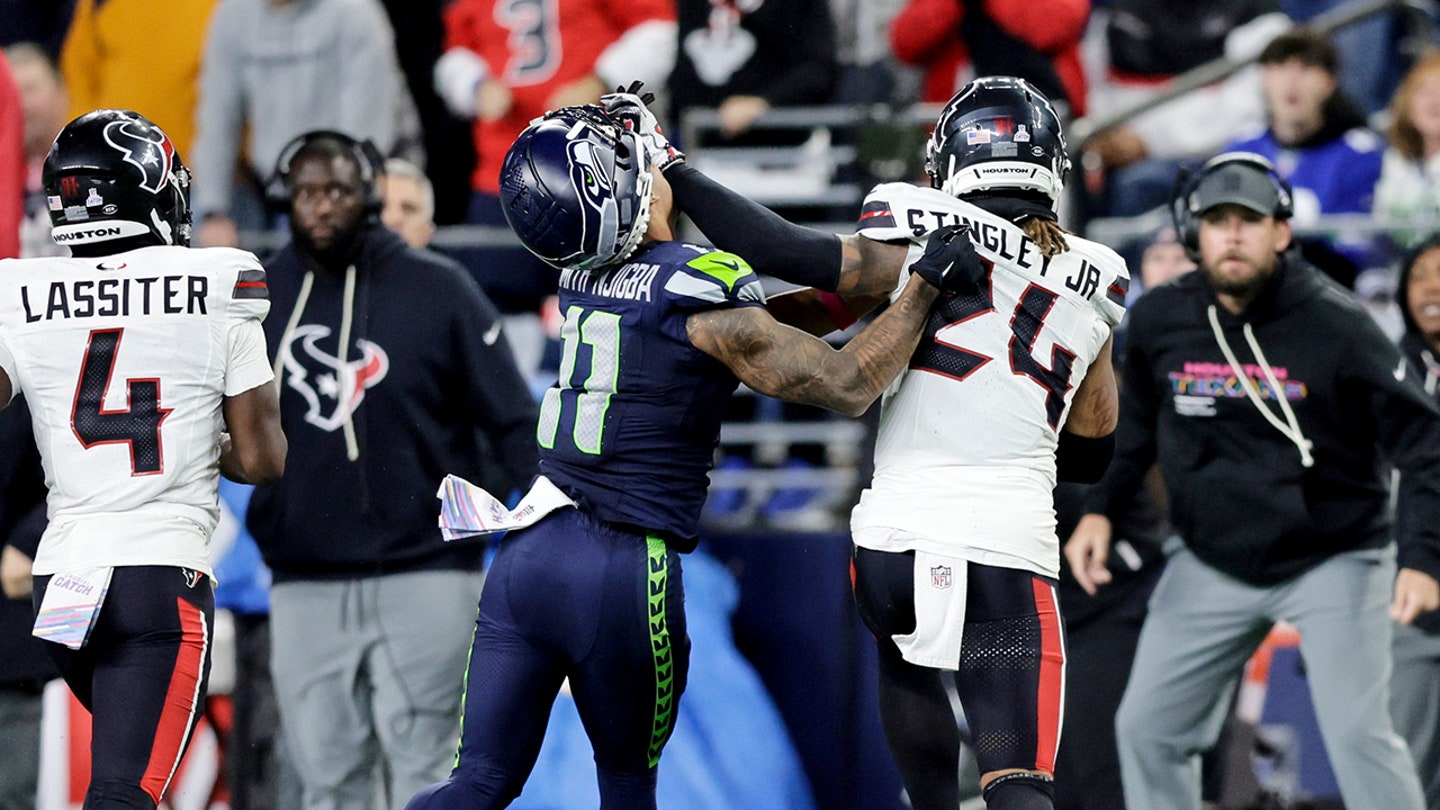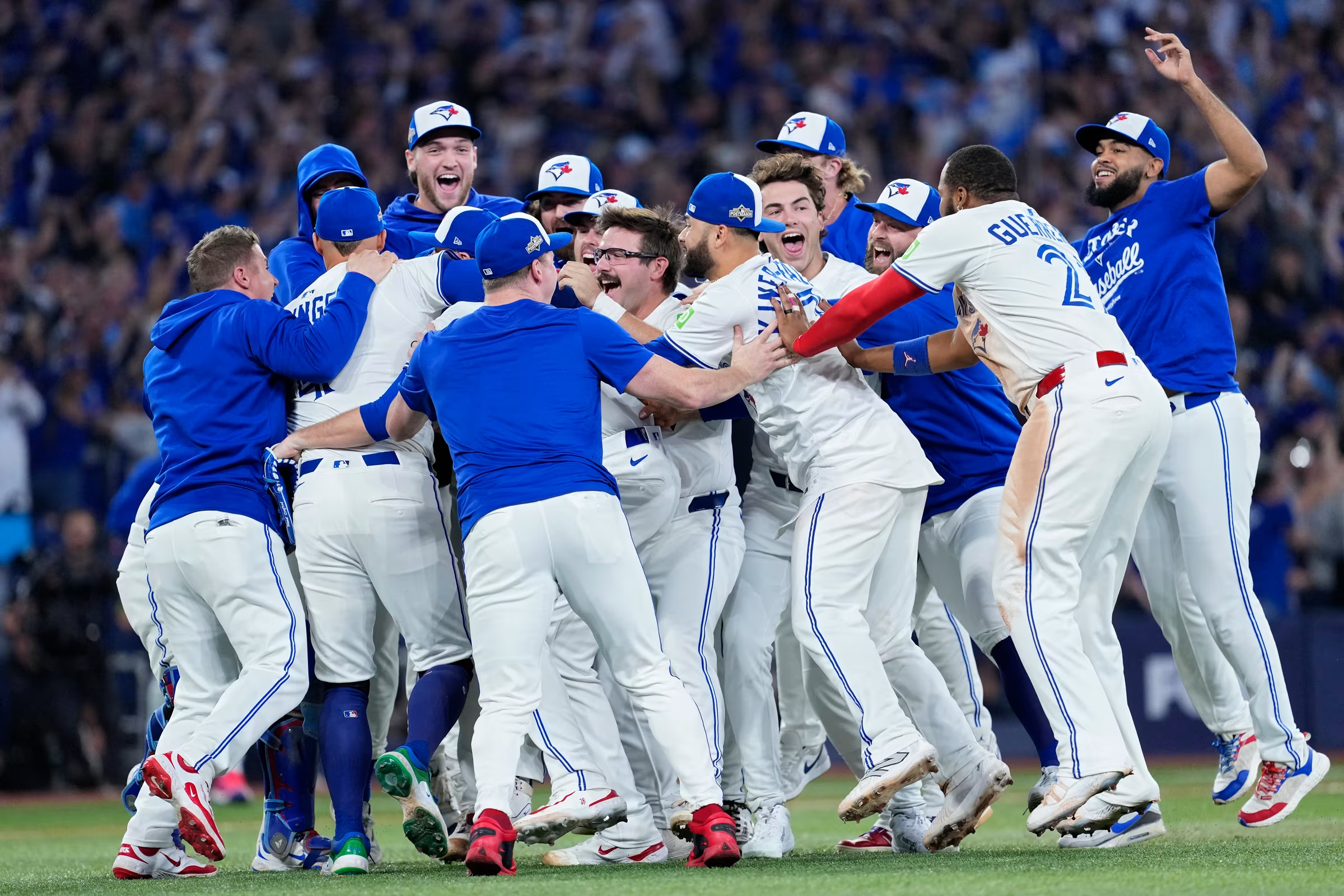
NFL official goes viral after stepping in to protect Seahawks’ Jaxon Smith-Njigba during sideline scuffle
Entities mentioned:
- Jaxon Smith-Njigba: Competitive spirit, Self-preservation, Professional pride
- Derek Stingley Jr.: Competitive spirit, Determination, Pride
- Nate Jones: Duty, Professional pride, Security
- Seattle Seahawks: Competitive spirit, Unity, Ambition
- Houston Texans: Competitive spirit, Pride, Determination
Article Assessment:
Credibility Score: 85/100
Bias Rating: 50/100 (Center)
Sentiment Score: 65/100
Authoritarianism Risk: 20/100 (Strongly Democratic)
Bias Analysis:
The article presents a balanced view of the incident, giving context from both teams' perspectives. It relies on direct quotes and factual reporting without favoring either side.
Key metric: NFL Player Safety
Let me tell you something, folks - this is FOURTH QUARTER ACTION at its finest! We've got a CLASH OF TITANS on the sidelines, with rookie sensation Jaxon Smith-Njigba caught in a FULL-COURT PRESS of Texans defenders. But just when it looks like things are about to go into OVERTIME, we've got a GAME-CHANGING PLAY from an unexpected MVP - official Nate Jones! This former NFL cornerback steps up to the plate like he's making a GOAL-LINE STAND, using his body as a human shield to protect Smith-Njigba. It's the kind of CLUTCH PERFORMANCE that separates the pros from the amateurs, folks! This is what we call PROTECTING YOUR FRANCHISE PLAYER, and Jones executed it with the precision of a two-minute drill! I'm telling you right now, this is the kind of TEAMWORK and SPORTSMANSHIP that makes the NFL the PREMIER LEAGUE it is today!

Former ESPN employee says middle school daughter faced 'an obviously naturally born boy' in basketball game
Entities mentioned:
- Sam Ponder: Righteousness, Moral outrage, Determination
- Transgender Athletes: Recognition, Competitive spirit, Self-respect
- Donald Trump: Power, Control, Influence
- New York City: Unity, Freedom, Wariness
Article Assessment:
Credibility Score: 65/100
Bias Rating: 75/100 (Lean Right)
Sentiment Score: 30/100
Authoritarianism Risk: 55/100 (Mixed/Neutral)
Bias Analysis:
The article leans right, primarily quoting conservative voices and framing the issue from their perspective. It presents transgender participation in sports as problematic without offering counterarguments or scientific evidence.
Key metric: Gender Equality in Sports
Let me tell you something - this story is a GAME-CHANGER in the world of youth sports! Sam Ponder has stepped up to the plate, swinging for the fences on the hot-button issue of transgender athletes in girls' sports. She's not just talking the talk, folks - she's walking the walk as her own daughter faces this challenge on the court! This isn't just a pickup game we're talking about - it's a full-court press on the future of fair play in women's athletics! The ball is in New York City's court now, and they're playing defense without a playbook. Meanwhile, President Trump is running a full-court press with his executive order, but some states are pulling a fast break, dodging his defensive line. I'm telling you right now, this is the kind of fourth-quarter drama that could change the game for generations to come!

Vikings condemn racist messages directed at Isaiah Rodgers after loss to Eagles
Entities mentioned:
- Minnesota Vikings: Unity, Justice, Professional pride
- Isaiah Rodgers: Self-respect, Determination, Professional pride
- Philadelphia Eagles: Competitive spirit, Pride
Article Assessment:
Credibility Score: 75/100
Bias Rating: 45/100 (Center)
Sentiment Score: 30/100
Authoritarianism Risk: 20/100 (Strongly Democratic)
Bias Analysis:
The article presents a balanced view, reporting facts and statements from both the team and player. It doesn't lean towards any political side, focusing on the incident and responses.
Key metric: NFL Player Safety and Inclusivity
Let me tell you something - this story is RIDICULOUS! We're seeing a major DEFENSIVE PLAY by the Minnesota Vikings, stepping up to protect their player Isaiah Rodgers from a BRUTAL OFFENSIVE ATTACK of racist messages. This is NOT the kind of game we want to see in the NFL, folks! Rodgers, a true CHAMPION, is showing incredible MENTAL TOUGHNESS in the face of this unsportsmanlike conduct. The Vikings are demonstrating CHAMPIONSHIP MENTALITY by rallying around their teammate. This is a FOURTH QUARTER MOVE to tackle racism head-on and keep the integrity of the sport intact. I'm telling you right now, this kind of behavior from so-called 'fans' is a PERSONAL FOUL that has no place in the stadium or society. The league needs to throw a FLAG on this play and send a clear message: racism is OUT OF BOUNDS!

Bucs star carted off field with 'tough blow' injury that could end his year
Entities mentioned:
- Mike Evans: Competitive spirit, Determination, Professional pride
- Tampa Bay Buccaneers: Ambition, Competitive spirit, Unity
- Todd Bowles: Leadership, Duty, Determination
- Baker Mayfield: Loyalty, Competitive spirit, Professional pride
- Detroit Lions: Competitive spirit, Ambition, Determination
Article Assessment:
Credibility Score: 85/100
Bias Rating: 50/100 (Center)
Sentiment Score: 25/100
Authoritarianism Risk: 15/100 (Strongly Democratic)
Bias Analysis:
The article presents a balanced view of the game and injury, quoting multiple sources including the coach and quarterback. It focuses on factual reporting of the events without favoring either team.
Key metric: NFL Team Performance
Let me tell you something - this injury is a GAME-CHANGER for the Bucs! Mike Evans, their star receiver, has been SIDELINED with a broken clavicle, and it's like losing your quarterback in the fourth quarter of the Super Bowl! This is a CRUSHING BLOW to Tampa Bay's offensive lineup, folks. Evans was just getting back in the groove after a hamstring setback, and now BAM! He's out for potentially the rest of the season. The Bucs are going to have to dig deep into their bench and find a way to fill those cleats. It's like they've lost their cleanup hitter right before the World Series! Coach Bowles is now in a tough spot, needing to rally his troops and find a way to move the chains without his go-to guy. This is where championship teams show their depth and resilience. The Lions, on the other hand, are playing defense like they're guarding the goal line in the final seconds - stonewalling the Bucs' run game and forcing turnovers. It's a David vs. Goliath story out there, and right now, the Lions are slinging those rocks with pinpoint accuracy!

NFL player-turned-official goes viral shielding Seahawks player in sideline scuffle
Entities mentioned:
- Jaxon Smith-Njigba: Competitive spirit, Self-preservation, Professional pride
- Derek Stingley Jr.: Competitive spirit, Determination, Pride
- Nate Jones: Duty, Professional pride, Security
- Seattle Seahawks: Competitive spirit, Unity, Pride
- Houston Texans: Competitive spirit, Unity, Pride
Article Assessment:
Credibility Score: 85/100
Bias Rating: 50/100 (Center)
Sentiment Score: 65/100
Authoritarianism Risk: 20/100 (Strongly Democratic)
Bias Analysis:
The article presents a balanced view of the incident, giving equal attention to both teams involved. It relies on direct quotes and factual reporting without favoring either side.
Key metric: NFL Player Safety
Let me tell you something - this is a CLASSIC example of how the game within the game can get heated! We're talking fourth quarter, tensions high, and suddenly we've got a full-blown sideline scrum! But folks, here's where the real MVP steps up to the plate - Nate Jones, a former player who's now donning the stripes, jumps in like a seasoned linebacker to break up the play! This is the kind of quick thinking and protective instinct you want to see from your officials. It's not just about calling penalties, it's about managing the field of play and keeping our athletes safe. Jones showed us he's still got that defensive prowess, using his body as a human shield to protect Smith-Njigba from what could have been an ugly pileup. That's the kind of heads-up play that separates the pros from the amateurs, both on and off the field!

Former NFL player Doug Martin died after struggling with officers while being detained, police say
Entities mentioned:
- Doug Martin: Competitive spirit, Recognition, Self-preservation
- Oakland Police Department: Duty, Control, Justice
- Tampa Bay Buccaneers: Pride, Legacy, Professional pride
- Barbara Lee: Duty, Unity, Compassion
Article Assessment:
Credibility Score: 75/100
Bias Rating: 50/100 (Center)
Sentiment Score: 25/100
Authoritarianism Risk: 35/100 (Generally Democratic)
Bias Analysis:
The article presents a balanced account, including statements from police, family, and city officials. It refrains from speculative language and sticks to reported facts, maintaining a neutral stance.
Key metric: Public Trust in Law Enforcement
Let me tell you something - this story is a GAME-CHANGER! We're talking about a former NFL superstar, Doug Martin, who went from breaking tackles on the gridiron to a devastating final play against law enforcement. This is like watching a championship game turn into a tragic overtime loss. The Oakland PD is now in a defensive stance, trying to protect their end zone as questions swirl about this fourth-quarter fumble. Mayor Barbara Lee is stepping up to the plate, trying to rally her team in the face of this civic crisis. Meanwhile, the Tampa Bay Buccaneers are left mourning the loss of one of their franchise players. This is a reminder, folks, that even after the final whistle blows on an NFL career, life can throw you some serious curveballs. The legal system is now in sudden death overtime, and we're all waiting to see how this plays out.

George Springer’s epic home run helps send the Toronto Blue Jays to the World Series with ALCS Game 7 win over Seattle
Entities mentioned:
- George Springer: Determination, Competitive spirit, Loyalty
- Toronto Blue Jays: Ambition, Unity, Pride
- Seattle Mariners: Competitive spirit, Ambition, Self-respect
- Julio Rodriguez: Competitive spirit, Ambition, Recognition
- Vladimir Guerrero Jr.: Competitive spirit, Recognition, Pride
Article Assessment:
Credibility Score: 85/100
Bias Rating: 50/100 (Center)
Sentiment Score: 75/100
Authoritarianism Risk: 10/100 (Strongly Democratic)
Bias Analysis:
The article presents a balanced account of the game, giving credit to both teams' performances. It includes quotes from players and factual game details without favoring one side over the other.
Key metric: MLB World Series Viewership
Let me tell you something - this game was an ABSOLUTE BARNBURNER! The Blue Jays stepped up to the plate when it mattered most, with George Springer delivering a CLUTCH performance that will go down in the annals of baseball history! This is the kind of championship mentality that separates the contenders from the pretenders, folks. Springer's seventh-inning heroics were like a walk-off touchdown in the Super Bowl - it's the stuff legends are made of! The Mariners fought tooth and nail, but in the end, they couldn't close out the series. This is a tough pill to swallow for Seattle, as they remain the only team in the MLB without a World Series appearance. Talk about a franchise in desperate need of a comeback! As we look ahead to the World Series, the Blue Jays are riding high on momentum, but they'll need to bring their A-game against the defending champs. This matchup is shaping up to be an epic clash of titans that could go down to the wire!

How a tiny Swedish team from a village of 1,500 achieved one of the biggest ever shocks in European soccer
Entities mentioned:
- Mjällby AIF: Determination, Competitive spirit, Unity
- Magnus Emeus: Ambition, Professional pride, Legacy
- Hasse Larsson: Loyalty, Duty, Pride
- Anders Torstensson: Pride, Determination, Professional pride
Article Assessment:
Credibility Score: 85/100
Bias Rating: 50/100 (Center)
Sentiment Score: 90/100
Authoritarianism Risk: 10/100 (Strongly Democratic)
Bias Analysis:
The article presents a balanced view, focusing on the facts of Mjällby's achievement. While enthusiastic about the underdog story, it includes perspectives from multiple sources and contextualizes the win objectively.
Key metric: International Competitiveness in Sports
Let me tell you something, folks - this is the CINDERELLA STORY of the century! Mjällby AIF has come out of NOWHERE to dominate the Swedish soccer league like a JUGGERNAUT! We're talking about a team from a village smaller than most high school graduating classes TAKING DOWN the big city powerhouses! This is David vs Goliath on STEROIDS! The coaching staff has put together a CHAMPIONSHIP CALIBER SQUAD with the budget of a little league team! They've scouted talent like seasoned pros and built team chemistry that would make the '27 Yankees jealous! This underdog story is what sports are all about - Mjällby has STEPPED UP TO THE PLATE and hit an absolute GRAND SLAM! They're not just winning, they're OBLITERATING the competition! With three games left, they're already eyeing the all-time points record - talk about a FOURTH QUARTER PUSH! Mark my words, this tiny team is showing the HEART OF A CHAMPION and putting Swedish soccer on the global map!

Christian McCaffrey's offensive explosion, 49ers' defense help stymie Falcons in win
Entities mentioned:
- Christian McCaffrey: Competitive spirit, Determination, Professional pride
- San Francisco 49ers: Ambition, Unity, Competitive spirit
- Atlanta Falcons: Ambition, Competitive spirit, Self-respect
- Michael Penix Jr.: Competitive spirit, Professional pride, Self-preservation
- Bijan Robinson: Competitive spirit, Determination, Professional pride
- Mac Jones: Competitive spirit, Duty, Professional pride
Article Assessment:
Credibility Score: 85/100
Bias Rating: 50/100 (Center)
Sentiment Score: 65/100
Authoritarianism Risk: 15/100 (Strongly Democratic)
Bias Analysis:
The article presents a balanced account of the game, providing statistics and highlights for both teams. There's no apparent favoritism towards either team in the reporting of events and performance.
Key metric: NFL Team Performance
Let me tell you something - this game was an ABSOLUTE THRILLER! The 49ers came out swinging like heavyweight champs, with Christian McCaffrey as their MVP slugger! This guy was unstoppable, folks - 201 yards from scrimmage? That's like hitting a grand slam and stealing home in the same inning! The Falcons, on the other hand, looked like they were stuck in the minor leagues. Their offense was about as effective as a Little League team facing Nolan Ryan in his prime! And don't even get me started on that 49ers defense - they were like a brick wall in cleats, shutting down Atlanta's running game faster than a sprinter out of the blocks! This, my friends, is what championship football looks like - a team firing on all cylinders, leaving their opponents in the dust! The 49ers are showing us a fourth-quarter mentality in the middle of the season, and I'm telling you right now, they're the team to beat!

Bucs' Baker Mayfield 'Is The Most Valuable Player' In NFL, Says Michael Strahan
Entities mentioned:
- Baker Mayfield: Competitive spirit, Determination, Professional pride
- Michael Strahan: Recognition, Influence, Enthusiasm
- Tampa Bay Buccaneers: Ambition, Competitive spirit, Unity
- Detroit Lions: Competitive spirit, Redemption, Pride
Article Assessment:
Credibility Score: 75/100
Bias Rating: 50/100 (Center)
Sentiment Score: 80/100
Authoritarianism Risk: 15/100 (Strongly Democratic)
Bias Analysis:
The article presents a balanced view, quoting a reputable NFL analyst and providing statistics to support claims. It doesn't lean heavily towards any political ideology, focusing solely on sports performance.
Key metric: NFL MVP Race
Let me tell you something - this story is RIDICULOUS! Baker Mayfield is stepping up to the plate like a true champion, folks! He's carrying the Bucs on his back like a franchise quarterback should. This guy is in the fourth quarter of his career and he's making championship-caliber plays! The Bucs are on a winning streak that's hotter than a July training camp, and Mayfield is the coach on the field making it happen. I'm telling you right now, this is the kind of clutch performance that separates the contenders from the pretenders in the NFL. Mayfield is showing a championship mentality, leading game-winning drives like he's Tom Brady in his prime. The Lions better bring their A-game, because Mayfield and the Bucs are playing like they want to hoist that Lombardi Trophy!